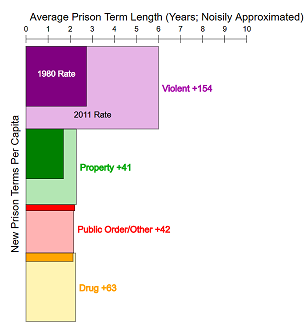Your correspondent has been away from the blog for most of the week, but here are a few odds and ends that merit Grits readers attention while mine is focused elsewhere:
An awkward death-row moment
TFW you find out
the guy you're about to execute tonight may confess to a murder you want to execute a guy for a month from now. Awkward! Death row inmates are held in solitary confinement, so the
union for prison guards has alleged that, if the two men conspired and even passed documents between their cells, as prosecutors allege, they were able to do so because of understaffing at Texas prisons. Certainly, this is more reason for courts to allow DNA testing in Swearingen's case - which the Court of Criminal Appeals recently denied - to make sure they're executing the right guy.
Texas senators and #cjreform
Texas Senator John Cornyn cited Texas' decarceration reforms in
touting a new federal sentencing reform package. And our two senators both sit on the Senate Judiciary Committee, meaning they'll have outsized voices in debates over bipartisan asset forfeiture reform amendments recently voted out of the US House. Go
here to send Texas senators an email asking them to support asset-forfeiture reform.
Time to ditch Harris County criminal courts building?
A Houston attorney makes the case for
scrapping the Harris County Criminal Justice Center after Hurricane Harvey flooding and starting over.
Racial disparities in juvie incarceration
Texas' racial disparities among incarcerated youth (4.4:1, black to white)
aren't the worst in the country, but they're nothing to write home about, either.
'Incompetent scientists using bad science'
The Austin crime lab's DNA screwups extended to capital cases, and the Court of Criminal Appeals has ordered a habeas investigation to
determine if the lab generated false or misleading evidence that was used at trial. A defense attorney with the Office of Capital and Forensic Writs criticized "forensic evidence developed by incompetent scientists using bad science."
Judges, advocates require self care
Judges
say they experience secondary traumatic stress from the awful stories they encounter at their jobs. The same could be said for prosecutors and defense attorneys, and for that matter, in many cases, reform advocates. Most of the innocence cases I've seen involved terrible, hair raising dramas which can be truly haunting. The stories don't leave you. Your correspondent can barely read jail mail anymore without a panic attack after more than two decades of advocacy in this area; the constant stream of tragedy and unmet need becomes overwhelming.
When judges cherrypick facts
News flash: SCOTUS Justices frequently
cherrypick facts that are sometimes flat-out wrong and are never held accountable. You're shocked, I know, to learn that judges might pick facts to support a pre-conceived opinion rather than derive their opinions from the facts. Except, oh wait, Grits readers are aware of the Government-Always-Wins faction at the Texas Court of Criminal Appeals, so for y'all this sort of outcome-oriented judging has likely already become apparent.
So if you can't execute the developmentally disabled, what do you do with them?
The
Moore case out of SCOTUS earlier this year limiting executions for the developmentally disabled is
calling into question at least ten additional Texas death cases, including five from Harris County. The case overturned the Texas Court of Criminal Appeals notorious
Briseno decision, an outcome-oriented ruling which applied outdated scientific standards to uphold dubious death sentences. (See above re: cherrypicking facts.)
Mass incarceration costs US economy $1 trillion
The
annual cost of incarceration totals more than $1 trillion, according to a new analysis, or more than 6 percent of Gross Domestic Product. Notably, according to one of the researchers, “More than half of the costs are borne by families, children and community members who have committed no crime.”
Bogus diagnosis?
Excited delirium: Legitimate medical diagnosis or
coverup vehicle for in-custody deaths caused by police? See
related Grits coverage.
What's causing overdoses: opiods or ignorance?
Some doctors are starting to push back on the prescriptions-caused-the-opiod-crisis narrative that's been prevalent lately, and
Scientific American has perhaps the best rendition of their argument I've seen.


.jpg)



